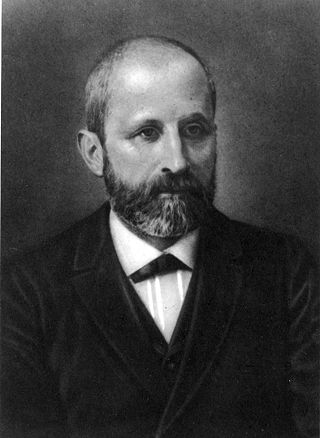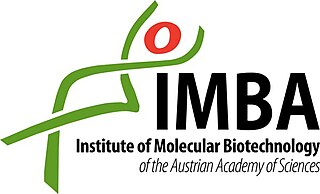
Johannes Friedrich Miescher was a Swiss physician and biologist. He was the first scientist to isolate nucleic acid in 1869. Miescher also identified protamine and made several other discoveries.

The University of Basel is a public research university in Basel, Switzerland. Founded on 4 April 1460, it is Switzerland's oldest university and among the world's oldest surviving universities. The university is traditionally counted among the leading institutions of higher learning in the country.

The Institute of Molecular Biotechnology (IMBA) is an independent biomedical research organisation founded by the Austrian Academy of Sciences in cooperation with the pharmaceutical company Boehringer Ingelheim. The institute employs around 250 people from over 40 countries, who perform basic research. IMBA is located at the Vienna BioCenter (VBC) and shares facilities and scientific training programs with the Gregor Mendel Institute of Molecular Plant Biology (GMI) of the Austrian Academy of Sciences and the Research Institute of Molecular Pathology (IMP), the basic research center of Boehringer Ingelheim.

The Friedrich Miescher Institute for Biomedical Research (FMI) is a biomedical research institute founded in 1970. Based in Basel, Switzerland, the FMI is affiliated with the University of Basel and the Novartis Institutes for BioMedical Research (NIBR). It is named after Friedrich Miescher. As of 2021, the FMI has around 340 collaborators, of which 20 are research group leaders, over 80 are postdoctoral collaborators and over 80 are postgraduate students participating in the FMI International PhD Program. The FMI is directed by Dirk Schübeler.
Brian Arthur Hemmings FRS is a British biochemist, and Senior Group Leader, at the Friedrich Miescher Institute for Biomedical Research. He is a member of the Faculty of 1000.

Erich Nigg is a Swiss cell biologist.

Anne Spang is a German Biochemist/Cell Biologist and Professor at the Biozentrum University of Basel, Switzerland.

Silvia Arber is a Swiss neurobiologist. She teaches and researches at both the Biozentrum of the University of Basel and the Friedrich Miescher Institute for Biomedical Research in Basel Switzerland.
Barbara HohnForMemRS is an Austrian molecular biologist, particularly known for her research into the Agrobacterium tumefaciens.
The EMBO Gold Medal is an annual award of the European Molecular Biology Organization (EMBO) given to young scientists for outstanding contributions to the life sciences in Europe. Laureates receive a medal and €10,000 and are invited to receive the award and present their research at the annual EMBO Meeting and to write a review published in The EMBO Journal. Medallists can only be nominated by EMBO Members.
Susan M. Gasser is a Swiss molecular biologist. From 2004 to 2019 she was the director of the Friedrich Miescher Institute for Biomedical Research in Basel, Switzerland, where she also led a research group from 2004 until 2021. She was in parallel professor of molecular biology at the University of Basel until April 2021. Since January 2021, Susan Gasser is director of the ISREC Foundation, which supports translational cancer research. She is also professor invité at the University of Lausanne in the department of fundamental microbiology. She is an expert in quantitative biology and studies epigenetic inheritance and genome stability. Recipient of multiple swiss and European awards, she was named member of the US Academy of Sciences in 2022.
Ruth Chiquet-Ehrismann was a Swiss biochemist and cell biologist working on interactions in the extracellular matrix.

Melissa Helen Little is an Australian scientist and academic, currently Theme Director of Cell Biology, heading up the Kidney Regeneration laboratory at the Murdoch Children's Research Institute. She is also a Professor in the Faculty of Medicine, Dentistry and Health Sciences, University of Melbourne, and Program Leader of Stem Cells Australia. In January 2022, she became CEO of the Novo Nordisk Foundation Center for Stem Cell Medicine reNEW, an international stem cell research center based at University of Copenhagen, and a collaboration between the University of Copenhagen, Denmark, Murdoch Children’s Research Institute, Australia, and Leiden University Medical Center, The Netherlands.
Vivian Li is a Hong Kong-born cell and developmental biologist working in cancer research at London's Francis Crick Institute. She has been researching how stem cells in the human bowel are programmed to ensure a healthy organ and what goes wrong when cancer develops. She is known for her work on the Wnt signalling pathway, discovering a new way that a molecule called Wnt is activated in bowel cancer. She won a Future Leaders in Cancer Research Prize in part for this discovery.

Isabelle M. Mansuy is a professor in neuroepigenetics in the Medical Faculty of the University of Zurich and the Department of Health Science and Technology of the Swiss Federal Institute of Technology Zurich. She is known for her work on the mechanisms of epigenetic inheritance in relation to childhood trauma.

Dirk Schübeler is a German researcher, Director of the Friedrich Miescher Institute for Biomedical Research (FMI) and professor at the University of Basel. He is an expert in gene regulation.

Nicolas H. Thomä is a German researcher, full professor at the EPFL School of Life Sciences and Director of the Paternot Chair for Cancer Research in Lausanne, Switzerland. He is a biochemist and structural biologist and a leading researcher in the fields of ubiquitin ligase biology and DNA repair.

Paola Picotti is an Italian biochemist who is Professor for Molecular Systems Biology at ETH Zürich. She is Deputy Head of the Institute for Molecular Systems Biology. Her research investigates how the conformational changes of proteins impact molecular networks with cells. She received numerous awarded awards, among which the 2019 EMBO Gold Medal.
Sophie Geneviève Elisabeth Martin Benton is a Swiss biologist who is Professor and Director of the Department of Fundamental Microbiology at the University of Lausanne. Her research investigates the molecular processes that underpin cellular fusion. She was awarded the EMBO Gold Medal in 2014.
Meritxell Huch is a stem cell biologist and director at the Max Planck Institute of Molecular Cell Biology and Genetics. Her research considers tissue regeneration and the development of tissue-specific disease models for human organs. She was awarded a European Research Council Consolidator Grant in 2023.












